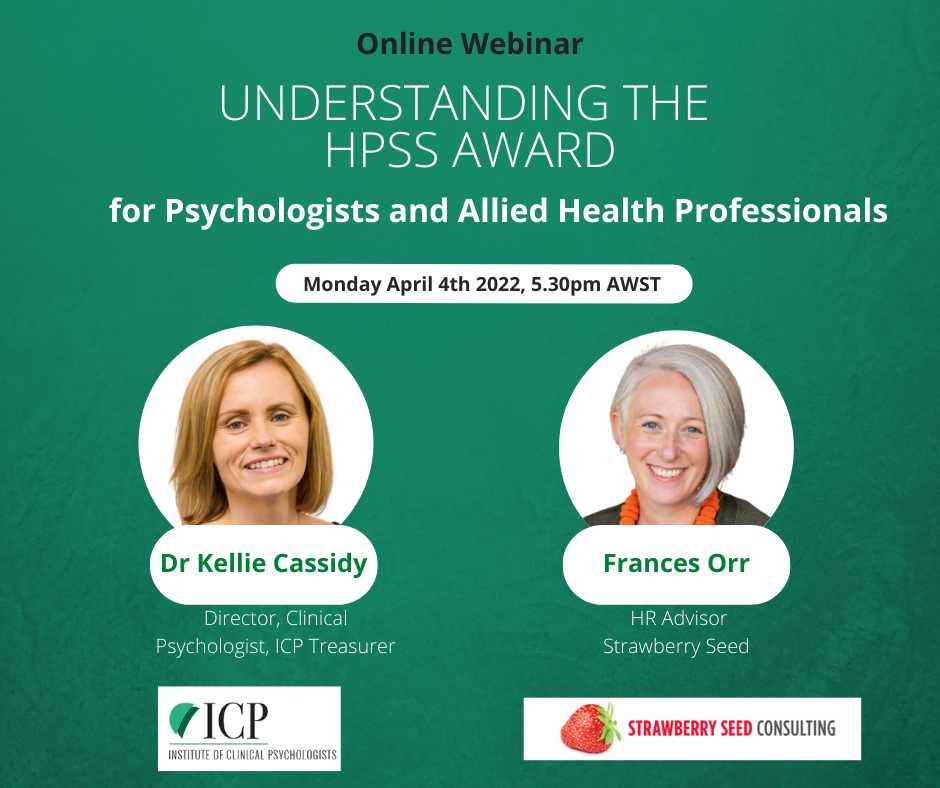Category: News
2022 ACPA Conference

What makes psychotherapy work and how can you improve outcomes?
Clinical psychologists are invited to attend the 2022 ACPA conference, exploring the therapeutic process, relationship and factors that underpin how and why psychotherapy works.
Register now embed link: https://www.trybooking.com/events/landing?eid=761836&
Some of the many benefits for clinical psychologists of attending the ACPA 2022 conference is the opportunity to network, to connect to colleagues, to get fresh ideas and of course, to relax and recharge in sunny and beautiful Cairns.
The conference will be held at Riley Crystalbrook Resort on the Esplanade, Cairns in tropical Far North Queensland on Friday 17 and Saturday 18 June 2022. Registrations are open until June 10.
The conference explores the therapeutic process, relationship and factors that underpin how and why psychotherapy works. Day 2 is a half day workshop hosted by Professor Robert Schweitzer and will focus on exploring the practical elements of working in the here and now.
A social event will be held between 6pm and 8pm after the first day of the conference at Rocco’s roof-top restaurant with a complimentary drink on arrival and canapes overlooking the beautiful Cairns Esplanade. This event will offer a chance to socialise with friends and colleagues and take in the views over the tropical city and sea.
Click here for more information about the event, the speakers and to register
Understanding the HPSS Award

Do you employ people within your practice? Clinicians and/or support staff?
Do you understand your obligations to your employees under the Health Professionals and Support Services Award of 2020?
ICP will be co-hosting a one-hour webinar on Monday 4th April 5.30pm AWST to help practice owners ensure they understand and are compliant with the Health Professionals and Support Services award.
This award applies to psychologists, medical staff, allied health professionals and support staff (this includes receptionists, practice managers, gardeners).
We appreciate the award can be confusing and contradictory. Many practice owners may be surprised to know that they are interpreting the award incorrectly and may in fact be underpaying their staff! This is particularly true for the span of Ordinary hours which is different for different professions under the award.
Attendees will be better able to understand:
• the classification levels under the award
• the impact of ordinary hours under the award
• the implications for ‘shift-workers’ under the award
• when penalty rates are to be applied and if you are paying enough
• leave entitlements of employees (including leave for COVID-19 related issues)
This webinar will be co-hosted by Dr Kellie Cassidy, Clinical Psychologist, and Ms Frances Orr, HR Advisor with Strawberry Seed.
Dr Kellie Cassidy is the Director of Prosper Health Collective, a group psychology practice in Perth Western Australia. Kellie has been a Clinic Psychologist for over 14 years and currently leads a team of 10 psychologists and 5 administration staff. Kellie is also the current Treasurer for the ICP and has been on the committee for the past 2 years.
Ms Frances Orr is a HR Advisor for Strawberry Seed. Strawberry Seed are a HR company based in Victoria who support many allied health professional businesses Australia wide. You can find out more about Strawberry Seed at https://strawberryseed.com.au/
The event will be recorded and a recording provided for those that can not make it on the day.
AHPRA Position Statement
AHPRA and the Psychology Board have released a joint statement ‘No place for sexism, sexual harassment or violence in healthcare’ which “reinforces the important role registered practitioners have in building and maintaining a culture of respect in healthcare. Respect is a cornerstone of good, professional practice and it is fundamental to the Australian community’s trust in registered health practitioners”. The joint statement is accessed via this link here.
ACPA / ICP Joint Statement – February 2021
New funding ensures expert care for veterans & families
Veterans most in need of specialist mental health services are now able to access the highest level of psychological care after an outreach funding commitment from leading veteran’s mental health service Open Arms to appropriately reimburse clinical psychologists for their services.
Open Arms Outreach Program Services has endorsed an increase in fees for clinical psychologists, to ensure veterans most in need of specialist mental health services will have access to expert care. This funding commitment to reimburse clinical psychologists for their services through Open Arms is part of a $94.3M funding commitment from the Australian Government.
The Australian Clinical Psychology Association (APCA) and Institute of Clinical Psychologists (ICP) welcomed the decision by Open Arms to ensure our most vulnerable veterans have access to the highest level of care.
ACPA President Prof Caroline Hunt said ACPA and ICP recognised the enormous value mental health professionals working in a range of fields were able to offer veterans and their families. However, this new funding is a crucial investment to support veterans.
‘’The funding commitment for outreach clinical psychologists will ensure those most in need of specialist mental health services will have access to expert care,” Prof Hunt said.
“The support provided to veterans through the Open Arms program is crucial and in line with Medicare and other funding arrangements, which recognise the expertise of accredited postgraduate training in clinical psychology.
“We are encouraging clinical psychologist members to be aware of the funding commitment from the Open Arms Outreach Program and to prioritise these urgent referrals.”
ICP President Dr Marjorie Collins said clinical psychologists had high levels of expertise in mental health disorders through accredited post-graduate training.
“High level training prepares clinical psychologists to provide the highest-level diagnostic assessments, formulation and specialist treatment, social skills training, family therapy, and group therapy. Clinical psychologists, by virtue of their high-level postgraduate training in mental health are well placed to provide the highest level of specialised care for Australian veterans and their families,” Dr Collins said.
Help is available on 1800 011 046 or visit Open Arms .
Contact details:
Australian Clinical Psychology Association
Institute of Clinical Psychologists


